
Sōtō Zen or the Sōtō school is the largest of the three traditional sects of Zen in Japanese Buddhism. It is the Japanese line of the Chinese Cáodòng school, which was founded during the Tang dynasty by Dòngshān Liánjiè. It emphasizes Shikantaza, meditation with no objects, anchors, or content. The meditator strives to be aware of the stream of thoughts, allowing them to arise and pass away without interference.
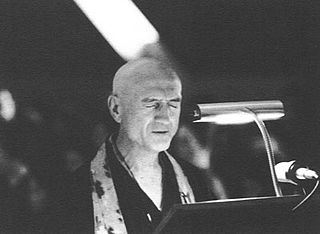
Philip Kapleau was an American Zen Buddhist teacher. He trained in the Harada–Yasutani tradition, which is rooted in Japanese Sōtō and incorporates Rinzai-school koan study. He established Rochester Zen Center, which grew to become one of the most influential Zen communities in the West. His independent lineage includes teachers active in the USA, Canada, Costa Rica, Mexico, Sweden, Finland, Germany, the UK and New Zealand.
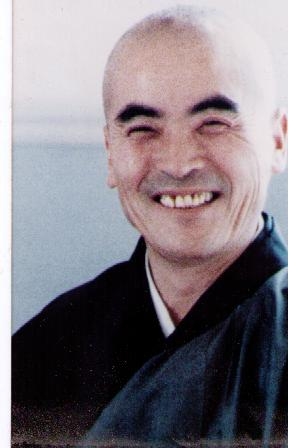
JikaiDainin Katagiri, was a Sōtō Zen priest and teacher, and the founding abbot of Minnesota Zen Meditation Center in Minneapolis, Minnesota, where he served from 1972 until his death from cancer in 1990. He is also the founder of Hokyoji Zen Practice Community in Eitzen, Minnesota. Before becoming first abbot of the Minnesota Zen Meditation Center, Katagiri had worked at the Zenshuji Soto Zen Mission in Los Angeles and had also been of great service to Shunryu Suzuki at the San Francisco Zen Center, particularly from 1969 until Suzuki's death in 1971. Katagiri was important in helping bring Zen Buddhism from Japan to the United States during its formative years. He is also the credited author of several books compiled from his talks.
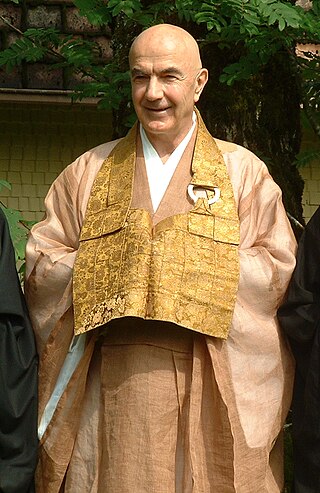
Richard Dudley Baker is an American Soto Zen master, the founder and guiding teacher of Dharma Sangha—which consists of Crestone Mountain Zen Center located in Crestone, Colorado and the Buddhistisches Studienzentrum (Johanneshof) in Germany's Black Forest. As the American Dharma heir to Shunryu Suzuki, Baker assumed abbotship of the San Francisco Zen Center (SFZC) shortly before Suzuki's death in 1971. He remained abbot there until 1984, the year he resigned his position after it was disclosed in the previous year that he and the wife of one of SFZC's benefactors had been having an affair. Despite the controversy connected with his resignation, Baker was instrumental in helping the San Francisco Zen Center to become one of the most successful Zen institutions in the United States.

Hakuyū Taizan Maezumi was a Japanese Sōtō Zen Buddhist priest who substantially contributed to development of Zen in the USA.

Japanese Zen refers to the Japanese forms of Zen Buddhism, an originally Chinese Mahāyāna school of Buddhism that strongly emphasizes dhyāna, the meditative training of awareness and equanimity. This practice, according to Zen proponents, gives insight into one's true nature, or the emptiness of inherent existence, which opens the way to a liberated way of living.
Charlotte Joko Beck was an American Zen teacher and the author of the books Everyday Zen: Love and Work and Nothing Special: Living Zen.

Eijun Linda Cutts is a Sōtō Zen priest practicing in the lineage of Shunryu Suzuki, a Senior Dharma Teacher at the San Francisco Zen Center. Cutts is a Dharma heir of Tenshin Reb Anderson, having received Dharma transmission from him in 1996. She served as co-abbess of the San Francisco Zen Center from 2000 to 2007, and had first begun practice at the San Francisco Zen Center in 1971; later, she was ordained a priest by Zentatsu Richard Baker in 1975. Currently living at Green Gulch Farm Zen Center, as abbess she had been aware of the significance in being a woman in a leadership position in religion that has historically been a patriarchy. In this vein, within her first year as abbess she instituted the ceremony in which female ancestors could be honored. She became Central Abbess of San Francisco Zen Center in 2014.

Hakuryu Sojun Mel Weitsman, born Mel Weitsman, was an American Buddhist who was the founder, abbot and guiding teacher of Berkeley Zen Center located in Berkeley, California. Weitsman was a Soto Zen roshi practicing in the lineage of Shunryu Suzuki, having received Dharma transmission in 1984 from Suzuki's son Hoitsu. He was also a co-abbot of the San Francisco Zen Center, where he served from 1988 to 1997. Weitsman was also editor of the book Branching Streams Flow in the Darkness: Zen Talks on the Sandokai, based on talks given by Suzuki on the Sandokai.

Sevan Ross is a Zen Buddhist priest and teacher with training backgrounds in both the Sōtō and Rinzai traditions in the Harada-Yasutani lineage. He is the former abbot and spiritual director of the Chicago Zen Center in Evanston, IL.

Bodhin Kjolhede is an American Sōtō/Rinzai Zen roshi and Abbot of the Rochester Zen Center (RZC), a position he assumed when Philip Kapleau retired from teaching in 1986. He founded the “Cloud-Water Sangha”, an international community of Zen centers led by teachers in his lineage.
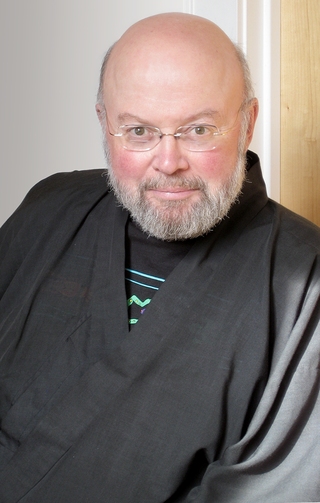
Stephen Tokan "Steve" Hagen, Rōshi, is the founder and former head teacher of the Dharma Field Zen Center in Minneapolis, Minnesota, and a Dharma heir of Dainin Katagiri-roshi. Additionally, he is the author of several books on Buddhism. Among them as of 2003, Buddhism Plain & Simple was one of the top five bestselling Buddhism books in the United States. In 2012, Hagen updated and revised How the World Can Be the Way It Is and published it as Why the World Doesn't Seem to Make Sense—an Inquiry into Science, Philosophy, and Perception.
Below is a timeline of important events regarding Zen Buddhism in the United States. Dates with "?" are approximate.
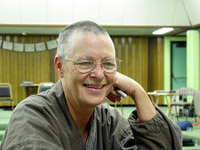
Seirin Barbara Kohn is a Sōtō Zen teacher and head priest of The Austin Zen Center (AZC) in Austin, Texas, practicing in the lineage of Shunryū Suzuki. She was ordained as a Soto priest by Reb Anderson and received Dharma transmission from Zenkei Blanche Hartman—Kohn being Hartman's first Dharma heir. The Austin Zen Center's temple name, Zenkei-ji, is named after Blanche Hartman. Kohn became head priest and resident teacher of AZC on October 13, 2002. Before assuming her leadership of AZC, Kohn served as President of the San Francisco Zen Center. Kohn is a supporter of LGBT rights, having been known to offer "commitment ceremonies" for same-sex couples, stating, "I simply treat them all the same."

Taigen Dan Leighton is a Sōtō priest and teacher, academic, and author. He is an authorized lineage holder and Zen teacher in the tradition of Shunryū Suzuki and is the founder and Guiding Teacher of Ancient Dragon Zen Gate in Chicago, Illinois. Leighton is also an authorized teacher in the Japanese Sōtō School (kyōshi).
Michael Danan Henry is an American Roshi in the Harada-Yasutani school of Zen Buddhism, a sect derived from both the Rinzai and Sōtō traditions of Japanese Zen, practicing in the Diamond Sangha lineage of Robert Baker Aitken. The founding teacher of the Zen Center of Denver, Henry received Dharma transmission from Philip Kapleau Roshi in 1989 and, after many years of subsequent training with Robert Aitken Roshi, was recognized as a Diamond Sangha teacher and master by Aitken. Danan Henry Roshi created and implemented the Monastery Without Walls training program; the Lotus in the Flame Lay Order; and the Every Minute Zen mindfulness training program as abbot and spiritual director of the Zen Center of Denver.

Rev. Kyōki Roberts (OPW) is a retired American Sōtō Zen priest. The single Dharma heir of Nonin Chowaney-roshi, Roberts received Dharma transmission in June 2001 and was a member of an organization of priests known as the Order of the Prairie Wind (OPW), which is now defunct. She studied Zen in Japan and in the United States.
Zen was introduced in the United States at the end of the 19th century by Japanese teachers who went to America to serve groups of Japanese immigrants and become acquainted with the American culture. After World War II, interest from non-Asian Americans grew rapidly. This resulted in the commencement of an indigenous American Zen tradition which also influences the larger western (Zen) world.
Zen lineage charts depict the transmission of the dharma from one generation to another. They developed during the Tang dynasty, incorporating elements from Indian Buddhism and East Asian Mahayana Buddhism, but were first published at the end of the Tang.
The Zen tradition is maintained and transferred by a high degree of institutionalisation, despite the emphasis on individual experience and the iconoclastic picture of Zen.












